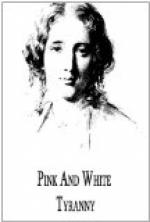“Know it? he ought to have known it! What business has a man to get a woman with a lot of babies round her, and then go capering off? ’Twasn’t the way I did, Polly, you know, when our babies were young. I was always on the spot there, ready to take the baby, and walk up and down with it nights, so that you might get your sleep; and I always had it my side of the bed half the night. I’d like to have seen myself out at a ball, and you sitting up with a sick baby! I tell you, that if I caught any of my boys up to such tricks, I’d cut them out of my will, and settle the money on their wives;—that’s what I would!”
“Well, pa, I shall try and do all in my power for poor Mrs. Ferrola,” said Mrs. Van Astrachan; “and you may be quite sure I won’t take another step towards Mrs. Follingsbee’s acquaintance.”
“It’s a pity,” said Mr. Van Astrachan, “that somebody couldn’t put it into Mr. John Seymour’s head to send for his wife home.
“I don’t see, for my part, what respectable women want to be gallivanting and high-flying on their own separate account for, away from their husbands! Goods that are sold shouldn’t go back to the shop-windows,” said the good gentleman, all whose views of life were of the most old-fashioned, domestic kind.
“Well, dear, we don’t want to talk to Rose about any of this scandal,” said his wife.
“No, no; it would be a pity to put any thing bad into a nice girl’s head,” said Mr. Van Astrachan. “You might caution her in a general way, you know; tell her, for instance, that I’ve heard of things that make me feel you ought to draw off. Why can’t some bird of the air tell that little Seymour woman’s husband to get her home?”
The little Seymour woman’s husband, though not warned by any particular bird of the air, was not backward in taking steps for the recall of his wife, as shall hereafter appear.
CHAPTER XXV.
WEDDING BELLS.
Some weeks had passed in Springdale while these affairs had been going on in New York. The time for the marriage of Grace had been set; and she had gone to Boston to attend to that preparatory shopping which even the most sensible of the sex discover to be indispensable on such occasions.
Grace inclined, in the centre of her soul, to Bostonian rather than New-York preferences. She had the innocent impression that a classical severity and a rigid reticence of taste pervaded even the rebellious department of feminine millinery in the city of the Pilgrims,—an idea which we rather think young Boston would laugh down as an exploded superstition, young Boston’s leading idea at the present hour being apparently to outdo New York in New York’s imitation of Paris.
In fact, Grace found it very difficult to find a milliner who, if left to her own devices, would not befeather and beflower her past all self-recognition, giving to her that generally betousled and fly-away air which comes straight from the demi-monde of Paris.




